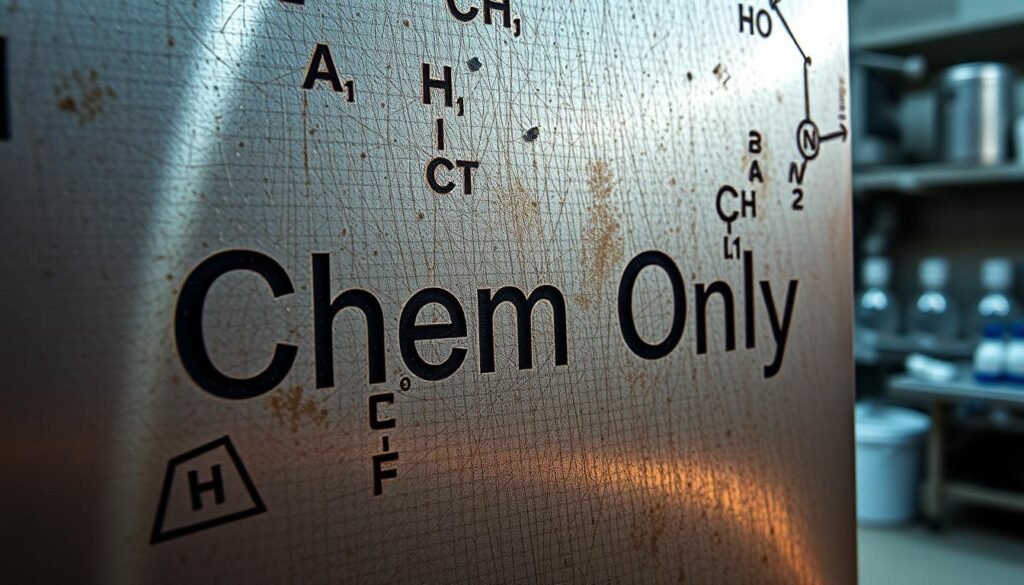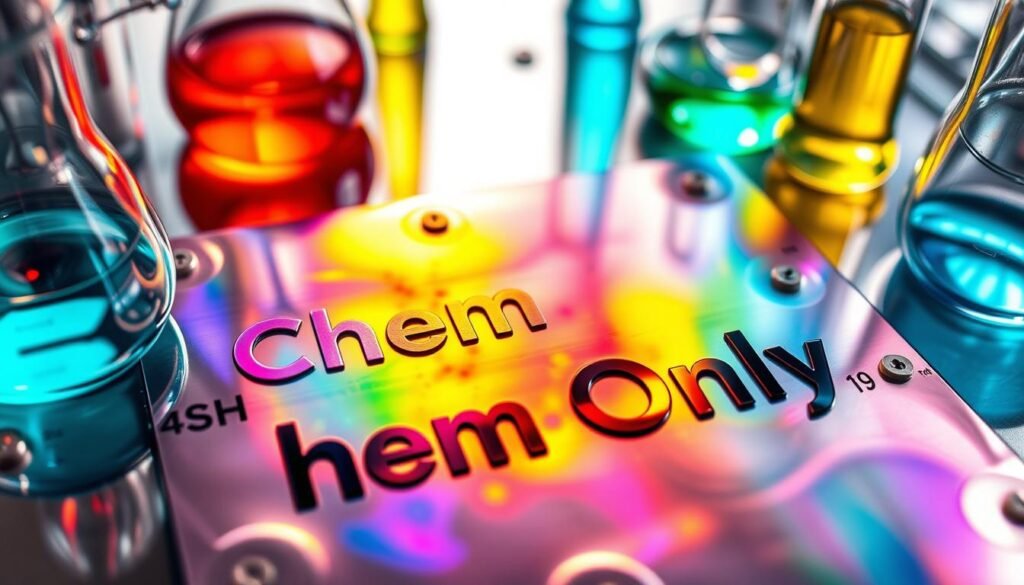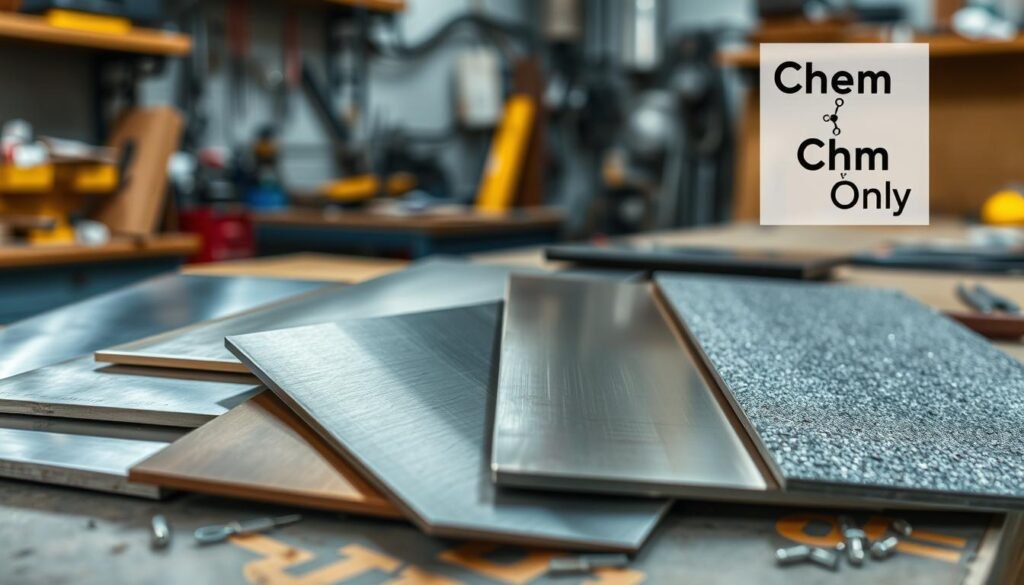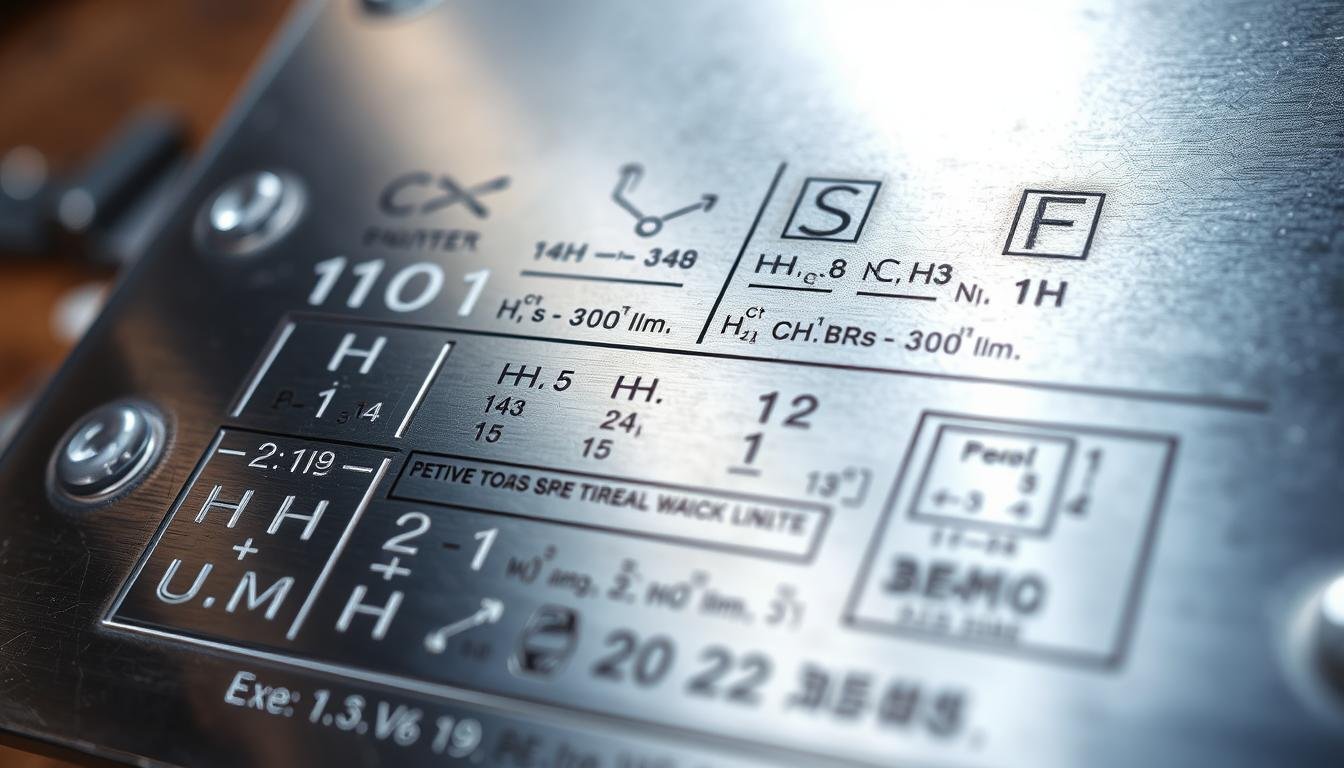In the world of metal sheet specifications, “Chem Only” is a term you’ll see. It’s key for knowing the chemical properties needed for metal sheets. For those making and buying metal sheets, “Chem Only” tells us our materials meet top material standards and rules.
This part talks about why “Chem Only” is important. It lays the groundwork for deeper talks on how these metals are used and their benefits. Knowing about “Chem Only” helps understand how special these sheets are for different needs.
Key Takeaways
- “Chem Only” refers to metal sheet specifications based on precise chemical properties.
- Understanding these standards ensures materials meet strict industry-grade requirements.
- This designation impacts applications and quality expectations of the metal.
- Manufacturers and buyers benefit from awareness of these material standards.
- Future sections will delve into types, benefits, and identification of “Chem Only” metal sheets.
The Basics of Metal Sheet Classifications
It’s key to know about metal sheet classifications in this field. They ensure we meet the needs of different projects well. Each metal sheet type is sorted by things like alloy compositions and uses.
What are Metal Sheets?
Metal sheets are flat, thin pieces of metal. They are widely used in construction, cars, and making things. They get their shape and properties from being rolled. This process tailors them for many structures. Knowing the material classifications helps us pick the right structural metals for projects.
Different Types of Metal Sheet Classifications
We can classify metal sheets in many ways. Each method gives us different details about the material:
- Alloy Compositions: Mixing metals to make an alloy changes the strength, flexibility, and use of the sheets. Common alloys are steel, aluminum, and copper.
- Temper: This is about how hard or elastic the metal is. The right temper means the sheet can handle its job well.
- Surface Finish: How the surface looks and feels is key too. It can be smooth, brushed, or have patterns, depending on the need.
Why Classifications Matter
The job of classifying metal sheet types is important for several reasons:
- Product Performance: Choosing the right class means the sheet will work well for its purpose.
- Safety: The correct classification keeps things safe by sticking to standards.
- Compliance with Standards: Following classifications helps meet rules and regulations. This makes sure the metal is okay to use in certain jobs.
This knowledge helps professionals choose wisely for their work. It boosts success and safety in their projects.
What Does “Chem Only” Mean on a Sheet of Metal?
In the metal industry, the phrase “Chem Only” means the focus is on chemical makeup, not how the metal behaves physically. This is key for jobs needing exact chemical mixes for certain uses.
Definition and Explanation
“Chem Only” focuses on what’s in the metal, like the mix of elements. For example, stainless steel has chromium, nickel, and molybdenum. These elements help it resist rust and stay strong at high temperatures. This way, the metal meets strict rules for special projects.
Common Uses and Applications
Many projects need metals that are just right chemically. “Chem Only” metals are perfect for parts facing tough conditions or that need to conduct electricity well. These are crucial in several areas:
- Aerospace
- Automotive
- Construction
- Medical Devices

Industries Relying on “Chem Only” Specifications
Different fields need “Chem Only” metals for their special requirements. The aerospace industry uses them for parts in extreme environments. Cars last longer and are safer with the right metals. In construction, such metals are chosen for their resistance to rust. And in healthcare, these metals are picked so they don’t react with the body, protecting patients.
Benefits of Using “Chem Only” Metal Sheets
“Chem Only” metal sheets bring key advantages that improve materials and save costs. By choosing these sheets, we get better product quality and consistency. They also help us save money.
Quality Assurance
The top advantage of “Chem Only” metal sheets is quality assurance. They focus on the chemical makeup, ensuring each batch meets high chemical standards. This achieves consistent material properties. It also lowers defect risks and boosts reliability.
Consistency in Production
Consistency is another major plus. Using “Chem Only” specs makes our production more predictable. This keeps the end products up to the needed standards. This is vital where material strength matters. According to Lieutenant Commander Michael Alberto de la Garza, such predictability aids in naval damage control with fewer people and more tech.
Cost Efficiency
Choosing “Chem Only” sheets also cuts costs. It lessens the need for lots of mechanical tests, making production smoother. This creates cost-effective materials and shortens production time. It reduces waste too, increasing profits. For those on tight budgets, “Chem Only” sheets are a smart pick without losing quality.

| Quality Metal Sheets | Production Consistency | Cost-Effective Materials |
|---|---|---|
| Guaranteed chemical composition | Predictable production processes | Reduced mechanical testing |
| Uniform material properties | Consistent product standards | Decreased production time |
| Higher reliability | Material integrity | Minimized waste |
How to Identify “Chem Only” Metal Sheets
Identifying “Chem Only” metal sheets is a detailed process. It checks if they match specific chemical compositions. A key step is to look at the Chem Only labels. These labels share important info about the sheet’s chemical use.

When inspecting the materials, it’s crucial to examine the metal sheets’ certifications and documents. These papers list the chemical makeup and traceability. They’re vital for confirming the “Chem Only” status.
- Chem Only Labels: Make sure the metal sheets have clear labels. They should show their chemical requirements.
- Material Inspection: Look at mill test reports (MTRs). They prove the metal’s chemical composition. MTRs are crucial for verifying material quality and standards.
- Certifications: Check if the certifications are real. These documents should meet industry rules and standards.
The table below outlines how to identify metal sheets for “Chem Only” uses:
| Identification Criteria | Description |
|---|---|
| Chem Only Labels | Labels showing necessary chemical properties for specific uses. |
| Mill Test Reports | Certify chemical makeup and standard conformity. |
| Certifications | Proof of industry compliance. |
By adhering to these steps, we guarantee the metal sheets fit the needed chemical specs. This careful selection of “Chem Only” metal sheets ensures they meet strict industry norms. They’ll perform reliably in chemical settings.
Conclusion
Understanding metal properties is key, especially the “Chem Only” label on metal sheets. This label means the metal’s chemistry was closely checked. It’s essential for picking the right material for our projects. This close look helps us ensure top-notch quality and consistency in our work.
The “Chem Only” tag is super important in fields like aerospace, automotive, and construction. Knowing about this tag helps experts choose materials that meet specific standards and rules. This ensures that the products will work well and last a long time.
By learning more about metal sheet classifications, we’re improving our industry practices. It’s not just about following rules. It’s about pushing for better engineering and making. Let’s keep learning about metal properties. Doing this will help us all do better and succeed in our work.
FAQ
What are Metal Sheets?
Metal sheets are thin and flat. They are made through an industrial process. These sheets are important in many industries. They have a thickness often described by their gauge.
Different Types of Metal Sheet Classifications
Metal sheets vary by alloy type, temper, and finish. Types include hot-rolled and cold-rolled steel, galvanized sheets, and aluminum. Each type fits certain standards for different uses.
Why Classifications Matter
Classifications ensure sheets meet performance and safety standards. They help pick the right sheet for specific needs. This makes sure quality and compatibility are consistent.
What Does “Chem Only” Mean on a Sheet of Metal?
“Chem Only” means the sheet’s value is in its chemical makeup. This marks how vital chemical qualities are. They matter in situations needing specific resistances or behaviors.
Common Uses and Applications of “Chem Only” Metal Sheets
These sheets are vital where exact chemical traits are needed. Like in aerospace, automotive, and construction. Think of parts that must resist corrosion or work in extreme temperatures.
Industries Relying on “Chem Only” Specifications
The aerospace, automotive, and construction sectors rely on “Chem Only” sheets. These fields need chemical consistency for their products and structures to be safe and reliable.
What are the Benefits of Using “Chem Only” Metal Sheets?
Benefits include assured quality and chemical composition verification. This leads to consistent production and cost savings. Physical testing is less needed, making production faster and reducing waste.
How to Identify “Chem Only” Metal Sheets
You can identify “Chem Only” sheets by checking labels, certificates, and paperwork. Mill Test Reports (MTRs) are key. They detail the metal’s chemical makeup to confirm it meets standards.


